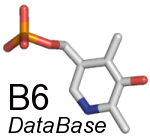|
|
| type |
Journal Article |
| authors |
Saito, K.; Kimura, N.; Ikegami, F.; Noji, M. |
| title |
Production of plant non-protein amino acids by recombinant enzymes of sequential biosynthetic reactions in bacteria |
| journal |
Biol Pharm Bull |
| Activity |
2.5.1.52 |
| sel |
selected |
| ui |
9013806 |
| year |
(1997) |
| volume |
20 |
| number |
1 |
| pages |
47-53 |
| | |
|---|
| keywords |
Acetyltransferases/genetics/*pharmacology |
| abstract |
We constructed the co-expression vector, pFK4, in which two cDNAs encoding serine acetyltransferase (SATase) and beta-(pyrazol-1-yl)-L- alanine/L-cysteine synthase (beta-PA/CSase) from Citrullus vulgaris (watermelon) were over-expressed under the transcriptional control of T7 promoter in Escherichia coli. Accumulation of both SATase and beta- PA/CSase in soluble extracts of E. coli was confirmed by immunoblotting. The high enzymatic activities of SATase and L-cysteine synthase (CSase) were detected in cell-free extracts of E. coli carrying pFK4. The activities of the formation of beta-PA and L- mimosine, plant non-protein amino acids, from O-acetyl-L-serine (OAS) and the precursor heterocyclic compounds, pyrazole and 3,4- dihydroxypyridine, were also found in the extracts. beta-PA was also produced in vivo from L-serine and pyrazole as precursors by E. coli cells transformed with pFK4. beta-PA was accumulated mainly in the extra-cellular culture medium. The pronounced accumulation of L- cysteine and L-methionine was observed in the cells transformed with pFK4. Additionally, we also constructed vectors which carried chimeric genes encoding fusion proteins of SATase and beta-PA/CSase. However, the fusion proteins tended to form insoluble inclusion bodies and thus to exhibit only weak enzymatic activities. The successful results of pFK4 shows the way to create a new sequential biosynthetic pathway of plant specific amino acids in bacterial cells by means of recombinant DNA technology. |
| last changed |
2009/07/07 12:01 |
|











